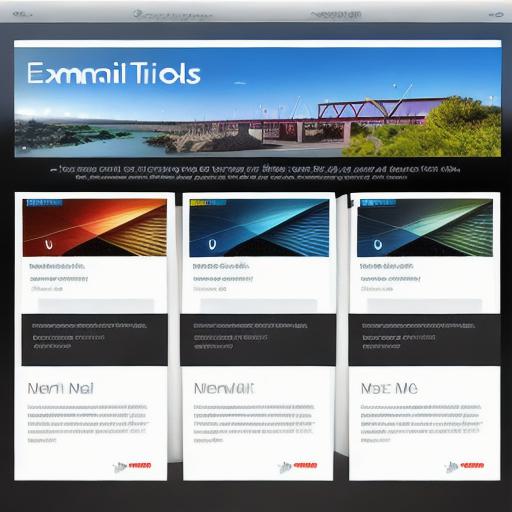Marketing is a complex process that requires a combination of skills, knowledge, and tools. While there’s no one-size-fits-all solution to marketing success, there are certain pieces of equipment that can help marketers achieve their goals more effectively. In this article, we’ll explore the essential equipment for marketing success and provide tips on how to choose the right tools for your business.

1. Social Media Management Tools
Social media is an integral part of modern marketing, with billions of active users across different platforms. However, managing social media accounts can be time-consuming and overwhelming. This is where social media management tools come in handy. These tools allow marketers to schedule posts, track analytics, and engage with followers more efficiently.
Some popular social media management tools include Hootsuite, Buffer, Sprout Social, and Later. Each tool has its unique features, so it’s essential to choose the one that best suits your business needs.
2. Email Marketing Tools

Email marketing is a cost-effective way to reach out to potential customers and keep them engaged. However, creating effective email campaigns can be challenging. This is where email marketing tools come in handy. These tools allow marketers to create customized email templates, track open rates, and segment their email lists for better targeting.
Some popular email marketing tools include Mailchimp, ConvertKit, Aweber, and Drip. Each tool has its unique features, so it’s essential to choose the one that best suits your business needs.
3. Content Creation Tools
Content is king in marketing, and creating high-quality content can help businesses attract more traffic and generate leads. However, creating engaging and informative content can be time-consuming and challenging. This is where content creation tools come in handy. These tools allow marketers to create visuals, videos, infographics, and other types of content with ease.
Some popular content creation tools include Canva, Adobe Spark, Animoto, and Powtoon. Each tool has its unique features, so it’s essential to choose the one that best suits your business needs.
4. Analytics Tools
Analytics is crucial in marketing, as it allows businesses to track their performance and make data-driven decisions. However, collecting and analyzing data can be overwhelming, especially for small businesses. This is where analytics tools come in handy. These tools allow marketers to track website traffic, social media engagement, email open rates, and other key metrics.
Some popular analytics tools include Google Analytics, Ahrefs, SEMrush, and Moz. Each tool has its unique features, so it’s essential to choose the one that best suits your business needs.
5. Video Marketing Tools
Video is a powerful marketing tool that can help businesses engage with their audience and increase conversions. However, creating high-quality videos can be challenging. This is where video marketing tools come in handy. These tools allow marketers to create professional-looking videos, edit them, and distribute them across different platforms.
Some popular video marketing tools include Animoto, Powtoon, Explainer Video, and Promo.com. Each tool has its unique features, so it’s essential to choose the one that best suits your business needs.
6. CRM Tools
Customer relationship management (CRM) is a critical aspect of marketing, as it allows businesses to manage their relationships with customers effectively. However, managing customer data can be overwhelming, especially for small businesses. This is where CRM tools come in handy. These tools allow marketers to store and analyze customer data, automate follow-up emails, and track sales.
Some popular CRM tools include Salesforce, HubSpot, Pipedrive, and Zoho CRM. Each tool has its unique features, so it’s essential to choose the one that best suits your business needs.
7. Project Management Tools
Marketing is a team effort, and managing multiple projects simultaneously can be challenging. This is where project management tools come in handy. These tools allow marketers to assign tasks, track progress, and collaborate with team members effectively.
Some popular project management tools include Asana, Trello, Monday.com, and Basecamp. Each tool has its unique features, so it’s essential to choose the one that best suits your business needs.
Choosing the Right Equipment for Marketing Success
When choosing the right equipment for marketing success, there are several factors to consider. These include:
- Budget: Your budget will determine which tools you can afford, and how much you’re willing to spend on each tool.
- Business size: The size of your business will affect your needs, with larger businesses requiring more sophisticated tools.
- Industry: Different industries have different marketing needs, so it’s essential to choose tools that are relevant to your industry.
- Goals: Your goals will determine which tools you need, with some tools being better suited for specific goals than others.
- Ease of use: You want to choose tools that are easy to use, as this will save you time and reduce the learning curve.
- Integration: It’s essential to choose tools that integrate well with other tools you’re already using, as this will streamline your workflow.
Case Study: How Equipment Helped a Small Business Succeed
Let’s take the example of John Smith, who runs a small e-commerce business. John has been running his business for two years and has been struggling to attract more customers. He has a limited budget and is not tech-savvy, so he was looking for tools that were easy to use and affordable.
John started by using social media management tools like Hootsuite and Buffer to manage his social media accounts. This helped him save time and increase engagement with his followers. He then started using email marketing tools like Mailchimp to create targeted email campaigns and increase sales.
John also started creating videos using Animoto, which allowed him to create professional-looking videos without any technical skills. He used these videos to showcase his products and increase brand awareness.
Next, John started using project management tools like Trello to manage his team’s tasks and track progress. This helped him stay organized and ensure that everyone was working towards the same goals.
Finally, John started using analytics tools like Google Analytics to track website traffic and sales. This allowed him to identify which marketing strategies were working and which ones needed improvement.
Thanks to these tools, John’s business saw a significant increase in traffic and sales within a few months. His social media accounts became more active, his email campaigns were more effective, and he was able to create high-quality videos that showcased his products.
FAQs
1. What is the most important equipment for marketing success?
The most important equipment for marketing success varies depending on your business needs and goals. However, social media management tools, email marketing tools, content creation tools, analytics tools, video marketing tools, CRM tools, and project management tools are all essential for achieving marketing success.
2. How much should I budget for marketing equipment?
The amount you should budget for marketing equipment depends on the size of your business and your goals. However, it’s important to remember that investing in quality equipment can save you time and money in the long run.
3. What is the best social media management tool for small businesses?
Hootsuite and Buffer are popular social media management tools that are suitable for small businesses. They offer a range of features at an affordable price, making them easy to use and cost-effective.
4. Do I need email marketing software if I have a website?
Yes, you do need email marketing software if you have a website. Email marketing allows you to build relationships with your customers and increase sales. Tools like Mailchimp are affordable and easy to use, making them suitable for small businesses.
5. Can I create videos without specialized equipment?
Yes, you can create videos without specialized equipment using tools like Animoto. These tools allow you to create professional-looking videos using pre-made templates and images, without any technical skills.
Conclusion
Marketing is a critical aspect of running a successful business, and investing in the right equipment can make all the difference. By choosing the right tools for your business needs and goals, you can streamline your workflow, increase engagement, and achieve marketing success. Whether you’re a small business owner or a large corporation, there are tools available to help you achieve your goals.




